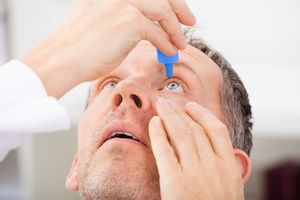Do you ever wonder why your eyes become dry and irritated throughout a long and busy day? A tear film that consists of three layers – mucus, diluted saltwater solution and lipids (fats and oils) – coats your eyes and keeps them comfortable. When your eyes fail to produce these layers, it can result in a disorder of the tear film, known as dry eye syndrome (DES) causing dryness and irritation in the eyes. DES is a common disorder resulting from decreased tear production, excessive tear evaporation, or abnormality in the production of mucus or lipids in the tear film.
What causes DES?
Several different factors can cause dry eye syndrome. Some of these factors include:
- Medications – antidepressants, antihistamines, or oral contraceptives can decrease tear production in your eyes, leading to DES
- Age – more common in people over 65
- Activities that require a lot of attention – these activities include watching TV, reading a book, or working on a computer
- You are more likely to prolong blinking during these activities, causing a reduction in your eyes’ ability to produce tears
Symptoms:
You may have dry eye syndrome if you are experiencing any of the following symptoms in your eyes:
- Dry, scratchy, or filmy feelings
- Burning or itching
- Redness
- Blurred vision
- A feeling of having a foreign body in your eyes
- Light sensitivity
*These symptoms can worsen in dry climates, cold weather, low humidity or heavy winds.
How is DES treated?
Treatment options vary between patients and depend on the severity of DES. Many conditions can be treated by the use of over-the-counter eye drops, also known as artificial tears. Your eye doctor may also prescribe medications to help your condition.
Conserving your eyes’ own tears is another way to keep your eyes moist. Tears drain out of the eye through a small channel into your nose. Your ophthalmologist may close these channels on a temporary or permanent basis. The closure conserves your own tears and makes artificial tears last longer.
Consult your doctor if you routinely experience symptoms of dry eye syndrome. They’ll help decide what treatment is best for you. For more information on dry eye syndrome, call Illinois Eye Center at (309) 243-2400 or visit our website at www.illinoiseyecenter.com. We’ll help you decide the next steps to take, and get your eyes feeling comfortable again.

